Food, fire crews and solar stages: The people of Glasto
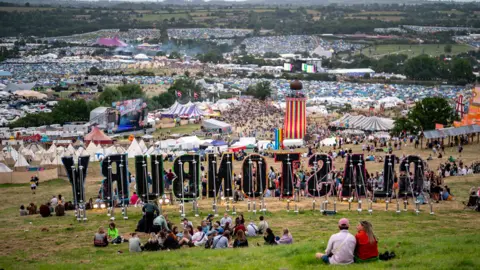 PA Media
PA MediaWith Glastonbury Festival in its final day, BBC Somerset has taken a look at some of the people working at the event and what it takes to care for a temporary city in the Somerset countryside with a population of 200,000.
Feeding the thousands
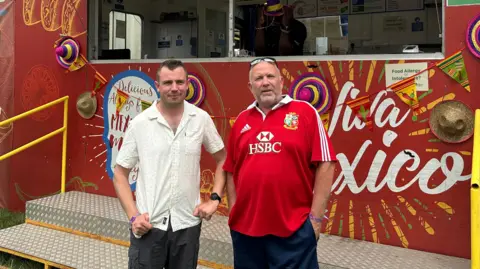
With so many people on site, food is central to keeping festival-goers energised. As you walk around there is food stall upon food stall offering every cuisine imaginable.
One of those is Tor Rugby Club, which is one of the last few remaining food vans run by volunteers.
The truck has been serving Mexican food at the festival for more than 25 years to help with the funding of the club - and has been in the Guardian's list of top 10 food vendors on site for the past few years.
Members Dan Ferriday and Rich Hopkins said the Glastonbury-based club began selling food at the festival to raise money to pay for the construction of its clubhouse in the early 2000s.
Mr Ferriday said customers now return each year to see them.
"We really pride ourselves on what we do here," added Mr Hopkins.
Keeping people safe
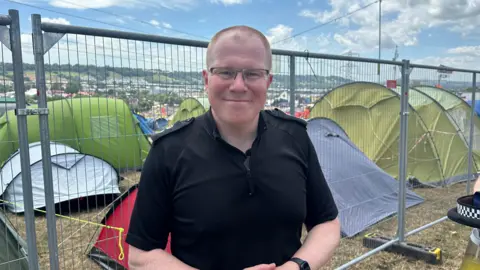
From food stalls to safety, at a festival centred around freedom, peace and love, there is a level of order being kept, although Avon and Somerset Police said there was very little crime on site.
Throughout the five-day period, police officers are on hand to deal with anything requiring their assistance - and can often be seen sporting fairy wings or other festival attire as they cycle around the site.
Ch Supt Olly Cosgrove said while it is important for police to remain professional, the festival is also a "great opportunity" to connect with the public.
"There are always enough police officers on site to make sure that we can respond to anything that we need to and can keep people safe," he said.
Ready to respond
Firefighters from Devon and Somerset Fire and Rescue are also at Glastonbury should anything go wrong.
"What we have seen this festival is an increase in things like carbon monoxide alarms going off, gas leaks, we have had a couple of incidents with large campervans for example," group commander Dan Searle said.
"So it's about making sure we understand the detection, making sure that we isolate and hand it over to the crews there."
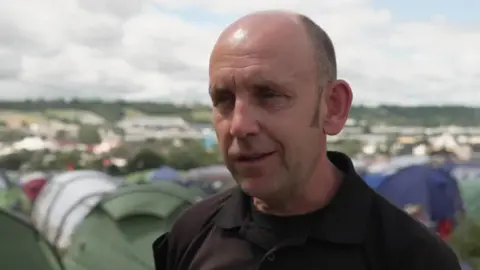
But working at a festival provides unique challenges.
Watch manager Barry Abraham said: "On the festival site, there is a limited supply of water, there are hydrants across the site, but there is a reduced amount compared to in urban areas."
Crews have to adapt and have compressed air foam that uses about a third less water for the same impact.
The crews work closely with Glastonbury's own fire wardens to keep the festival safe and Mr Searle said the festival also gives them a chance to spread fire safety messages.
Accessibility
For anyone feeling overwhelmed or in need of a moment's peace at the festival, they can take themselves off to one of five sensory calm spaces on site.
The areas are aimed at those who are neurodiverse, but provide a safe and calming place for all festival-goers seeking a moment of solace.
Diverse UK first opened calm spaces at Glastonbury Festival 2022 and now has them in the West Holts, Silver Hayes and Shangri-La areas.
Andrew Powell and Harry Jones, who are behind the charity, said the areas help neurodiverse people to "de-escalate themselves with sight, sound, touch and smell".
"Going to festivals can be hard for some people," Ms Jones said.
She told BBC Radio Somerset: "It's not just the crowds, it's the unknown expectations, the stress of getting to the site, the change in routine, it can be quite disorientating and all encompassing for those who are neurodiverse."
Pint, anyone?
With thousands of people on the site for almost a week, it would be strange if the working farm did not sell any of its own dairy produce at the festival.
Gavin Roberts is a volunteer at Masqueraders Carnival Club which provides the festival with its dairy products - including pints of Worthy Farm milk.
Mr Roberts said the club began volunteering at the site in 1985 when Michael Eavis asked a "few of the original members" to milk the cows, bottle the milk and give it to punters in exchange for festival tickets.
He describes Sir Michael as being a patron of the carnival club and said the demand of supplying the festival with produce has "grown a lot since then".
Going off-grid
Croissant Neuf is one of the longest-running stages at the festival, and is also the only section of Worthy Farm that is "completely off grid".
The area has set the stage for many big artists over the years, with Ed Sheeran even making his Glastonbury debut there in 2011.
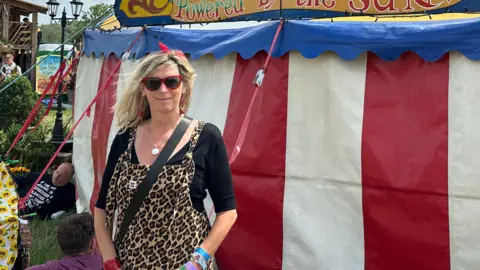
Sally Howell, who runs the solar-powered field, said Sheeran was just 19 when he approached her asking to perform on the stage.
"He turned up with a couple of friends and the band Nizlopi asking if he could do a couple of songs after their set," she said.
"He even used my great big wagon to practice in, ahead of going on stage."
Follow BBC Somerset on Facebook and X. Send your story ideas to us on email or via WhatsApp on 0800 313 4630.
